September 2017 Events (Surrey, Vancouver, Kelowna, Victoria, BC-wide)
Bookmark this post! It will be updated as more events are announced. You can also get frequent updates via our Twitter. Have a suggestion? Email us.
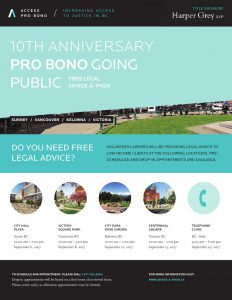 September 6-19 (various dates): Access Pro Bono Advice-a-Thon:
September 6-19 (various dates): Access Pro Bono Advice-a-Thon:
- September 6 (10am-2pm) Surrey
- September 8 (10am-5pm) Vancouver
- September 12 (10am-2pm) Kelowna
- September 15 (10am-2pm) Victoria
- September 19 (4-6pm) BC-Wide Telephone Clinic
Clients will be low-and modest-income individuals, including homeless people who may otherwise have limited access to traditional free legal advice clinics. Most clients will have pre-scheduled appointments, while others will simply drop in for free legal advice on a wide range of issues. We hope that with your support we can make this year’s event our most successful one yet! E-mail: help[at]accessprobono.ca
- Monday, September 11 (6-8pm): NSSN SRL Support Group Meeting at 2772 East Broadway, Vancouver.
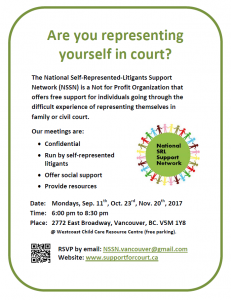
We offer Social Support and share legal resources in a confidential setting. This group is run by Self Represented Litigants for Self Represented Litigants. We have a great group with lots of experience to share! We meet monthly. RSVP at the following link: https://supportforcourt.ca/support-groups-2/british-columbia
- Wednesday, September 13 (9:30am-12pm): The New Societies Act: What You Need to Know at 100 – 938 Howe Street, Vancouver.
There are more than 27,000 non-profit societies in BC, providing services and programs that touch virtually every citizen. All pre-existing BC societies need to transition to the new BC Societies Act. The Act includes many significant changes. There is a two-year transition period by which time all societies in BC will have to have filed a transition application. This workshop will provide your society with the information it needs on whether to make any bylaw or policy changes necessary for your society to transition to effectively function under the new Act. Details & registration for this workshop. Questions? administrator@lawfornonprofits.ca
- Monday, September 18 (5:30-7pm): Amici Curiae’s newest Workshop – VPL at Alma VanDusen Room, VPL Central Branch, Downtown Vancouver.
Amici Curiae is excited to announce it is launching a new legal forms workshop in partnership with the Vancouver Public Library. This new workshop will ultimately be at the centrally located Oakridge Branch and will offer assistance with legal forms, including in the areas of: BC Court of Appeals (civil and family law matters); Supreme Court of BC Civil and family law matters; Provincial Court of BC affidavits; BC Human Rights Tribunal applications; and employment, tenancy and foreclosure matters.
Our free service is available to the public, including battered women, transgender persons, and Indigenous people. We will be hosting an information session and we invite you to come hear more about the services we will be offering at this new workshop. Please RSVP by e-mail to Yvonne Choi at YChoi@harrisco.com.
- Wednesday, September 20 (1-2:30pm): Nidus
 presentation at 1420 West 12th Avenue, Vancouver.
presentation at 1420 West 12th Avenue, Vancouver.
Attend a free presentation conducted by a Nidus-trained volunteer. Learn about planning for incapacity and end-of-life. Find out how to book an appointment for personal help to make and register your planning documents. No registration required.
- Thursday, September 21 (8:30am-5pm): 2017 Info Summit
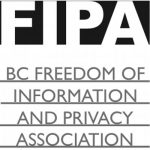 at UBC Robson Square Theatre, Vancouver.
at UBC Robson Square Theatre, Vancouver.
Presented by: BC Freedom of Information and Privacy Association
Given the recent shift in the provincial political climate, we are pleased to announce that we are breaking away from the biennial tradition this year and will be hosting our 7th BC Information Summit on September 21, 2017 at UBC Robson Square. This is an important time in the information and privacy landscape. The change of political leadership in BC gives us the opportunity to bring much-needed attention to the major deficits in our access to information and privacy frameworks. Major changes are on the horizon in terms of the freedom of information systems at both the federal and provincial levels. Courts, committees and Commissioners have made major recommendations for change which would bring major changes to the system. This Conference has assembled a range of experts from varying backgrounds to look at these developments and what they might mean for information and privacy rights.
- Thursday, September 21 (10am-12pm): Information About Your Rights (Her Everyday Resilience)
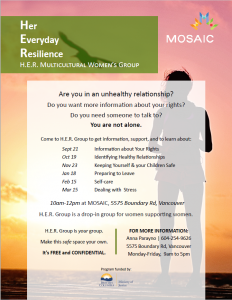 at MOSAIC Boundary – 5575 Boundary Road, Vancouver.
at MOSAIC Boundary – 5575 Boundary Road, Vancouver.
The “Her Everyday Resilience (H.E.R.) Multicultural Women’s Group” is a drop-in group that is held once a month from September to March (except December) for multicultural women who have experienced violence in relationships in their past or present. Hosted by MOSAIC’s Stopping the Violence Counselling and Multicultural Outreach Services, it’s free and confidential. If you know a woman who may benefit from this group, please share this information with her and encourage her to call the Women’s Support Worker at 604-254-9626 ext. 1081. If a woman isn’t yet ready to do group work, the STV Counselling program and Multicultural Outreach Services can also provide individual counselling support and outreach for those who have experienced, or are at risk of, abuse, threats, violence in relationships, sexual assault, or childhood abuses. Register online.
- Friday, September 22 (3:30-6:30pm): AMSSA’s 40th Anniversary AGM in Creekside Community Centre, 1 Athletes Way, Vancouver.

AMSSA is a unique province-wide association that strengthens over 70 member agencies as well as hundreds of community stakeholder agencies who serve immigrants and newcomers, and build culturally inclusive communities, with the knowledge, resources and support they need to fulfill their mandates. Celebrate their 40th anniversary. Register online.
- Monday, September 25 (5:30-8:30pm): Community Legal Assistance Society presents CLAS’ Annual General Meeting.
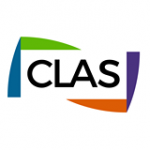
For information, please contact Rita Hatina, Director of Finance & Administration, at 604-673-3125 or rhatina@clasbc.net
 at CLAS. Samrah acts as the first point of contact for all clients and advocates accessing the Community Law Program’s services. She listens to their stories, gleans relevant information, helps clients gather documents from various sources in order to complete a program intake, and links clients and callers to other resources and referrals when appropriate. She also plays a role in community outreach, public legal education and research, and works towards program goals surrounding residential tenancy.
at CLAS. Samrah acts as the first point of contact for all clients and advocates accessing the Community Law Program’s services. She listens to their stories, gleans relevant information, helps clients gather documents from various sources in order to complete a program intake, and links clients and callers to other resources and referrals when appropriate. She also plays a role in community outreach, public legal education and research, and works towards program goals surrounding residential tenancy. Besides providing direct services to hundreds of people every year, we’re involved in a number of systemic advocacy actions.
Besides providing direct services to hundreds of people every year, we’re involved in a number of systemic advocacy actions.


